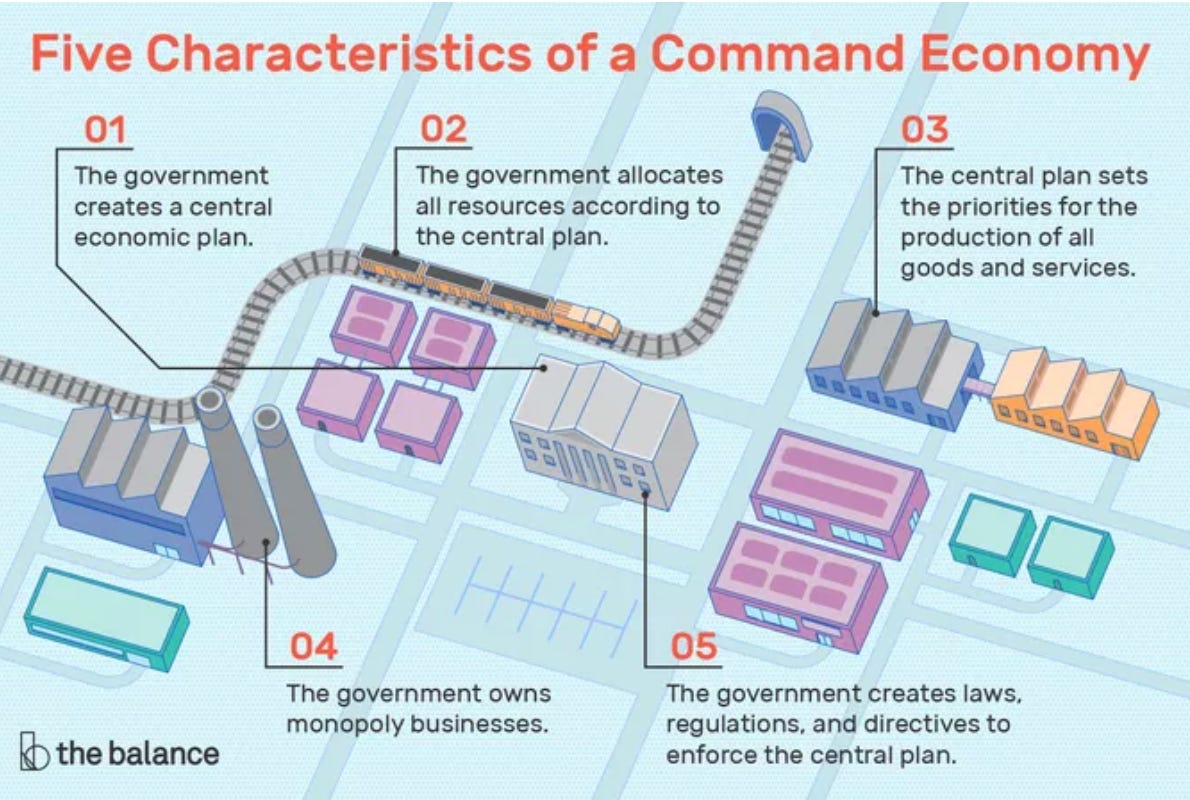
“If you control the food supply, you control everything,”
The UN envisions a global command economy
I spent the afternoon reading the UN’s 2030 agenda, with its 17 goals and 169 targets. This is an agenda that the UN has been working towards building since 1992 -
Frankly, it was terrifying. My take away thought was that once you strip the unicons and butterflies out of the text, this unilateral consensus document reads like an updated communist manifesto .
This is particularly relevant because while the Agenda 2030 is a not a legally binding instrument, but the regional and international human rights Conventions and Covenants at the core of Agenda 2030 are, in fact, binding instruments of international law. So, for now - we can insist that our politicians fight against the more draconian aspects of agenda 2030.
Now, at first glance -most of the 169 targets of Agenda 21 are rather “fuzzy.” but extremely naive objectives. They are the goals of a command economy government, not an organization for world peace! Frankly, they are the goals of a failed governmental model. A model that has been tried again and again.
Definition: A command economy is a system in which a central government makes all economic decisions. Either the government or a collective owns the land and the means of production.
But let’s go back a step to the beginning of the United Nations (UN). After World War II, the UN was developed by a number of nations to end wars and maintain world peace. Slowly, over time, 193 nations have become members.
It has morphed into a leviathan organization; with tentacles that reach into all member nations. Its various agreements and goals have dictates regarding the economy, health, poverty, migration, “reproductive “ health, monetary systems, digital IDs, environmental controls, control of agricultural markets, universal living wage worldwide, governmental systems, etc.
The UN has partnerships and strategic agreements with member nations, 100s of non-governmental organizations -like the Bill and Melinda Gates Foundation, the World Bank, and the World Economic Forum. It has developed many offspring organizations, such as UNESCO and the World Health Organization.
The UN has signed strategic agreements with all of the major organizations and world powers to fulfill a utopian vision of the world that includes a global governing power that will ensure no poverty, no discrimination, universal healthcare and reproductive care, no dirty energy, no unequal food distribution, a living wage and a reversal of climate change by UN intervention on member nations. Basically a new world order- with unelected officials in control.
It no longer is enough to work for world peace, they now are fulfilling the role of a globalized government. It has many, many signed treaties signers and strategic agreements with its member nations. These agreements include statements that governments will not do anything that would go against the United Nations 2030 agenda. That includes “equity” for all. That is, a universal living wage.
Honestly, one has to wonder what was the US Government thinking when it signed these agreements? It is as if the US Government just decided to turn over sovereignty to the United Nations!
But don’t just take my word for it – instead lets take direct quotes from their 169 targets in their newest and biggest initiative “Agenda 2030:”
Remember - these targets are to be on a GLOBAL level by 2030 and member nations are to ensure that these goals are not thwarted. These are just a few of the goals found in Agenda 2030 and they do not cover other strategic agreements signed by UN member nations:
The list of 17 Sustainable Development Goals and 169 Targets
Ensure significant mobilization of resources from a variety of sources, including through enhanced development cooperation, in order to provide adequate and predictable means for developing countries, in particular least developed countries, to implement programmes and policies to end poverty in all its dimensions.
Create sound policy frameworks at the national, regional and international levels, based on pro-poor and gender-sensitive development strategies, to support accelerated investment in poverty eradication actions protection due to conflict
Correct and prevent trade restrictions and distortions in world agricultural markets, including through the parallel elimination of all forms of agricultural export subsidies and all export measures with equivalent effect, in accordance with the mandate of the Doha Development Round.
Adopt measures to ensure the proper functioning of food commodity markets and their derivatives and facilitate timely access to market information, including on food reserves, in order to help limit extreme food price volatility.
By 2030, ensure universal access to sexual and reproductive health-care services, including for family planning, information and education, and the integration of reproductive health into national strategies and programmes
Achieve universal health coverage, including financial risk protection, access to quality essential health-care services and access to safe, effective, quality and affordable essential medicines and vaccines for all
Support the research and development of vaccines and medicines for the communicable and noncommunicable diseases that primarily affect developing countries, provide access to affordable essential medicines and vaccines, in accordance with the Doha Declaration on the TRIPS Agreement and Public Health, which affirms the right of developing countries to use to the full the provisions in the Agreement on Trade Related Aspects of Intellectual Property Rights regarding flexibilities to protect public health, and, in particular, provide access to medicines for all
By 2030, ensure that all girls and boys complete free, equitable and quality primary and secondary education leading to relevant and Goal-4 effective learning outcomes
By 2030, ensure equal access for all women and men to affordable and quality technical, vocational and tertiary education, including university
By 2030, ensure that all learners acquire the knowledge and skills needed to promote sustainable development, including, among others, through education for sustainable development and sustainable lifestyles, human rights, gender equality, promotion of a culture of peace and non-violence, global citizenship and appreciation of cultural diversity and of culture’s contribution to sustainable development
Ensure universal access to sexual and reproductive health and reproductive rights as agreed in accordance with the Programme of Action of the International Conference on Population and Development and the Beijing Platform for Action and the outcome documents of their review conferences
By 2030, achieve full and productive employment and decent work for all women and men, including for young people and persons with disabilities, and equal pay for work of equal value (my note - yes, this means a command economy -ergo communism).
Ensure equal opportunity and reduce inequalities of outcome, including by eliminating discriminatory laws, policies and practices and promoting appropriate legislation, policies and action in this regard
Adopt policies, especially fiscal, wage and social protection policies, and progressively achieve greater equality
Improve the regulation and monitoring of global financial markets and institutions and strengthen the implementation of such regulations
Facilitate orderly, safe, regular and responsible migration and mobility of people, including through the implementation of planned and well-managed migration policies
By 2030, ensure access for all to adequate, safe and affordable housing and basic services and upgrade slums
By 2030, provide access to safe, affordable, accessible and sustainable transport systems for all, improving road safety, notably by expanding public transport, with special attention to the needs of those in vulnerable situations, women, children, persons with disabilities and older persons
By 2030, enhance inclusive and sustainable urbanization and capacity for participatory, integrated and sustainable human settlement planning and management in all countries
Support positive economic, social and environmental links between urban, peri-urban and rural areas by strengthening national and regional development planning
By 2030, substantially increase the number of cities and human settlements adopting and implementing integrated policies and plans towards inclusion, resource efficiency, mitigation and adaptation to climate change,
Rationalize inefficient fossil-fuel subsidies that encourage wasteful consumption by removing market distortions, in accordance with national circumstances, including by restructuring taxation and phasing out those harmful subsidies, where they exist, to reflect their environmental impacts, taking fully into account the specific needs and conditions of developing countries and minimizing the possible adverse impacts on their development in a manner that protects the poor and the affected communities
Developed countries to implement fully their official development assistance commitments, including the commitment by many developed countries to achieve the target of 0.7 per cent of ODA/GNI to developing countries and 0.15 to 0.20 per cent of ODA/GNI to least developed countries ODA providers are encouraged to consider setting a target to provide at least 0.20 per cent of ODA/GNI to least developed countries
Develop effective, accountable and transparent institutions at all levels
Ensure responsive, inclusive, participatory and representative decision-making at all levels
Broaden and strengthen the participation of developing countries in the institutions of global governance
By 2030, provide legal identity for all, including birth registration
Now, many of the above are legitimate goals - BUT for a nation, not as a world governance.
The UN has overstepped.
















The very sad thing is that if I forward this to many of my friends and perhaps even my brother, who is an Interventional Cardiologist, they will shrug and giggle. What is it going to take to make the world wake up? I’ve been following this since Beck wrote about Agenda 21 all those years ago and watching this plan progress has been frightening.
What can WE do? How can we the people stop this?
Before I start reading this article with this challenging title, a short notice: Thank you so much for your attendance at the summit yesterday in Irland! I always enjoy listening to you and Jill!! Sometimes I really became emotional, almost tearing up, what you do for the world, not only for the humans but also for nature!! We are one - humans and nature! Also loved Ryan Cole - he is always at his best! Much love and gratitude from Austria, Bettina